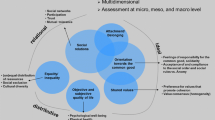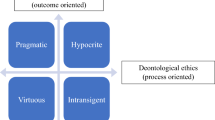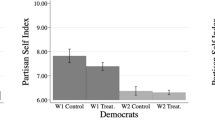Abstract
Civil society has been considered pivotal to democracy, but the causes of its performance have remained controversial. According to one view the political context is a critical factor in shaping the contours of civil society. Another suggests that whether democracy prevails is contingent on society itself and the associations comprising it. In a test of these views it was assumed that if society prevails associations would vary by type. If the state is more important, then associations would be expected to score similarly on the democratic scale. It was also expected that variation among the types of performance would cut across group categories, reflecting general attributes of the polity. Data were derived from a survey conducted among voluntary associations in Israel (n = 360). Findings showed that (a) associations scored similarly on the democratic scale, (b) the scores for the democratic performance were not influenced by group category, and (c) the least performed function was integration.
Similar content being viewed by others
REFERENCES
Ahrne, G. (1998). Civil society and uncivil organizations. In: Alexander, J. C. (ed.), Real Civil Societies: Dilemmas of Institutionalization, Sage, London.
Basok, M. (2001). A striking rise in public expenditure to 54.4 percent of the Gross Domestic Income. Haaretz, August 22.
Bella, R. N., Madsen, R., Sullivan, W. M., Swidler, A., and Tipton, S. M. (1985). Habits of the Heart: Individualism and Commitment in American Life, Harper & Row, New York.
Ben-Eliezer, U. (1999). Is civil society emerging in Israel? Politics and identity in the new associations. Israel Sociol. 1(2): 51-98 (Hebrew).
Berger, P. L., and Neuhaus, R. J. (1996). To Empower People: From State to Civil Society, AEI Press, New York.
Berry, J. M. (1977). Lobbying for the People: The Political Behavior of Public Interest Groups, Princeton University Press, Princeton, NJ.
Booth, J. A., and Richard, P. B. (1998). Civil society and political context in Central America. Am. Behav. Sci. 42(2): 33-66.
Burstein, P., Einwohner, R. L., and Hollander, J. A. (1995). The success of political movements: A bargaining perspective. In: Craig Jenkins, J., and Klandermans, B. (eds.), The Politics of Social Protest: Comparative Perspectives on States and Social Movements, University of Minnesota Press, Minneapolis.
Cohen, A., and Susser, B. (2000). Israel and the Politics of Jewish Identity, The Johns Hopkins University Press, Baltimore.
Diamond, L. (1994). Rethinking civil society: Toward democratic consolidation. J. Democracy 5: 5-17.
Dowse, R., and Hughes, J. (1977). Sporadic interventionists. Polit. Stud. 25: 84-92.
Dryzek, J. (1996). Political inclusion and the dynamics of democratization. Am. Polit. Sci. Rev. 90: 475-487.
Elazar, D. J. (1975). The local elections: Sharpening the trend toward territorial democracy. In: Arian, A. (ed.), The Elections in Israel 1973, Jerusalem, Academic Press, Jerusalem.
Elazar, D. J. (1986). Israel: Building a New Society, Indiana University Press, Bloomington.
Foley, M. W., and Edwards, B. (1996). The paradox of civil society. J. Democracy 7: 38-52.
Fukuyama, F. (2001). Social capital, civil society and development. Third World Q. 22: 7-20.
Gidron, B. (1995). Mapping the Third Sector in Israel: Research Findings, Ben Gurion University, Beersheba, Israel.
Gidron, B., Katz, H., and Bar, M. (2000). The Third Sector in Israel 2000: The Sector's Duties (in Hebrew), Ben Gurion University, Beersheba, Israel.
Grant, W. (1998). Pressure Groups. Politics and Democracy in Britain, Philip Allan, New York.
Hirschman, A. O. (1971). Exit, Voice and Loyalty, Harvard University Press, Cambridge, MA.
Hyden, G. (1998). Civil society, social capital, and development: Dissection of a complex discourse. Stud. Comp. Int. Dev. 32(1): 3-30.
Ilan, S. (1999). On the road to civil rebellion. Haaretz, February 10.
Keane, J. (ed.) (1988). Civil Society and the State, Verso, London.
Lehman-Wilzig, S. N. (1990). Stiff-Necked People, Bottle-Necked System: The Evolution and Roots of Israeli Public Protest, 1949–1986, Indiana University Press, Bloomington.
Lehmbruch, G. (1984). Interest intermediation in capitalist and socialist systems: Some structural and functional perspectives in comparative research. Int. Polit. Sci. Rev. 4: 153-172.
Levi, M. (1996). Social and unsocial capital: A review essay on Robert Putnam's “Making Democracy Work.” Polit. Soc. 24(1): 45-55.
Lindblom, C. (1977). Politics and Markets: The World's Political Economic Systems, Basic Books, New York.
Lipset, S. M. (1960). Political Man: The Social Bases of Politics, Doubleday, Garden City, NY.
Maloney, W. A., Smith, G., and Stoker, G. (2000). Social capital and associational life. In: Baron, S., Field, J., and Scholler, T. (eds.), Social Capital: Critical Perspectives, Oxford University Press, Oxford.
Michels, R. (1962[1915]). Political Parties, The Free Press, New York.
Minkoff, D. C. (1997). Producing social capital: National and social movements and civil society. Am. Behav. Sci. 40(5): 606-618.
Newton, K. (2002). Trust, social capital, civil society, and democracy. Int. Polit. Sci. Assoc. 22: 201-214.
Nir, U. (2001). Leadership reluctant to demonstrate: Youngsters want action. Haaretz, September 11.
Olson, M. (1982). The Rise and Decline of Nations, Yale University Press, New Haven, CT.
Pateman, C. (1970). Participation and Democratic Theory, Cambridge University Press, Cambridge.
Pedahzur, A., and Yishai, Y. (1999). Hatred by hated people: Xenophobia in Israel. Stud. Conflict Terrorism 22: 101-118.
Pelczynsky, Z. (1988). Solidarity and the rebirth of civil society. In: Keane, J. (ed.), Civil Society and the State, Verso, London.
Petracca, M. (1992). Introduction. In: Petracca, M. (ed.), The Politics of Interests: Interest Groups Transformed, Westview, Boulder, CO.
Putnam, R. D. (1993). Making Democracy Work: Civic Traditions in Modern Italy, Princeton University Press, Princeton, NJ.
Putnam, R. D. (2000). Bowling Alone: The Collapse and Revival of American Community, Simon & Schuster, New York.
Rose, R., Mishler, W., and Haerpfer, C. (1987). Social capital in civic and stressful societies. Stud. Comp. Int. Dev. 32: 85-111.
Salamon, L., and Anheier, H. (1994). The Emerging Sector: An Overview, The Johns Hopkins Institute for Policy Studies, Baltimore.
Schlumberger, O. (2000). The Arab Middle East and the question of democratization: Some critical remarks. Democratization 7(4): 104-132.
Seligson, A. L. (1999). Civil association and democratic participation in Central America: A test for the Putnam thesis. Comp. Polit. Stud. 32: 342-362.
Shalev, H. (2000). Deep hatred toward the Arabs: Confrontation with the orthodox will lead to violence. Haaretz, September 29.
Shalev, H. (2001). A bad spirit. Maariv, September 14.
Shelah, O. (2002). The Hebrew rebels' movement. Yediot Ahronot, May 10.
Stolle, D., and Rochon, T. (1998). Are all associations alike? Member diversity, associational type, and the creation of social capital. Am. Behav. Sci. 42(1): 47-65.
Tal, H. (1999). Black feminism, white feminism. Kolbo, August 20.
Tarrow, S. (1989). Struggle, Politics, and Reform: Collective Action, Social Movements, and Cycles of Protest, Western Societies Program, Occasional Paper No. 21, Cornell University, Ithaca, NY.
Tarrow, S. (1996). Making social science work across space and time: A critical reflection on Robert Putnam's “Making Democracy Work.” Am. Polit. Sci. Rev. 90(2): 389-397.
Wuthnow, R. (1994). Sharing the Journey: Support Groups and America's New Quest for Community, The Free Press, New York.
Wuthnow, R. (1998). Loose Connections: Joining Together in America's Fragmented Communities, Harvard University Press, Cambridge.
Yishai, Y. (1991). Land of Paradoxes: Interest Politics in Israel, State University of New York Press, Albany.
Yishai, Y. (2001). Bringing society back in: Post-cartel parties in Israel. Party Polit. 7: 667-688.
Author information
Authors and Affiliations
Rights and permissions
About this article
Cite this article
Yishai, Y. Civil Society and Democracy: The Israeli Experience. VOLUNTAS: International Journal of Voluntary and Nonprofit Organizations 13, 215–234 (2002). https://doi.org/10.1023/A:1020303908944
Issue Date:
DOI: https://doi.org/10.1023/A:1020303908944




